

Students learn more effectively from print textbooks than screens, study says. Screen vs. paper: what is the difference for reading and learning? Introduction It all started with a project at Uppsala University Library in Sweden called ‘Mobile Academics’, where we held seminars on how to use the library’s e-resources on a tablet computer and gave tips on different apps to use when studying.
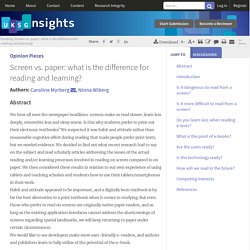
This project led to another seminar about the difference between reading on screen and on paper. To prepare for it, we read scientific articles and picked out a few of those as examples. We chose to focus on the articles that were more current, since studies made on screens from 1985 cannot be compared with the studies made on today’s screens. It is not only the devices that have evolved, either: people have, too. Is it dangerous to read from a screen? In the early years of the railway, people were seriously concerned about how the speed (18 mph or 30 kmph) would affect the human body. New inventions do make our lives easier in many ways, but they can also cause worries and troubles – both actual and imaginary. Original | PPT Figure 1 Figure 2. Children’s and young people’s reading - new research, articles and blogs - Anne Harding Training.
I’m always drawn to pictures of children and books.
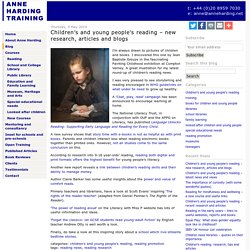
I discovered this one by Jean Baptiste Greuze in the fascinating Painting Childhood exhibition at Compton Verney. Why reading aloud is a vital bridge to literacy. I was very lucky to have been brought up in a household where my older brother and my father read out loud to me as a teenager.
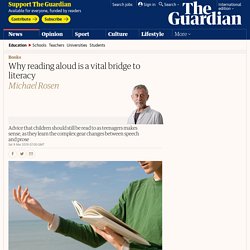
It was a form of conversation or entertainment. They were “hey-listen-to-this” moments, taking in Dickens, Hardy, Catch-22, Catcher in the Rye, the Molesworth books, newspapers, magazines, Konrad Lorenz’s science books, Alan Moorehead’s accounts of exploration and any random passage from their studies. Come to think of it, my father didn’t stop! In his 70s, when I was in my 40s, my father still read me the stories he wrote about his childhood. His intonation, his pronunciation of Yiddish, our cackling at his jokes live on.
Children’s and young people’s reading - latest news and views - Anne Harding Training. You are never too young for books!
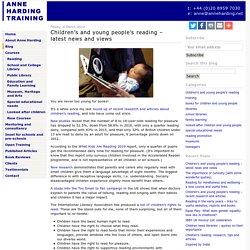
Children’s and young people’s reading - latest news and views - Anne Harding Training. Egmont Consumer Insight Day Press Release FINAL. Britain’s battle to get to grips with literacy is laid bare in H is for Harry. Life repeats itself, Grant says dejectedly.
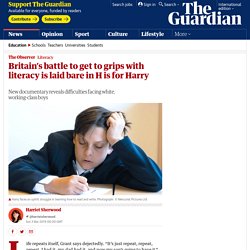
“It’s just repeat, repeat, repeat. UK WKAR 2019 report. UK Education Blog. Reading Time: 3 minutes How does a narrow curriculum disadvantage the disadvantaged?
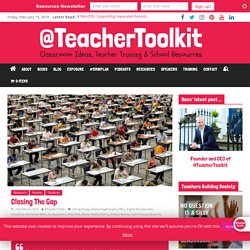
New research suggests that “both teachers and parents think that exam pressures are leading schools to narrow the curriculum as more time is taken up for exam preparation. The research also highlights that people believe the problem has worsened over the past three years. Over 900 teachers and 1,000 parents of children under 18 were polled in September and October of 2018. The results were conclusive. Research Findings Webinar Last week I chaired a webinar with GL Assessment discussing the findings of their Closing the Gap report. Conclusions The report concludes that there seems little doubt that both teachers and parents share the views of many education experts, that exam pressure is leading to an unacceptable narrowing of the curriculum, particularly at Key Stage 3 but also in primary school in the run-up to Key Stage 2.
You can listen to the webinar below and/or download the full research report. Related. Reading improves teenagers' vocab, whatever their background, say researchers - Economic and Social Research Council. Students learn more effectively from print textbooks than screens, study says. Today’s students see themselves as digital natives, the first generation to grow up surrounded by technology like smartphones, tablets and e-readers.
Teachers, parents and policymakers certainly acknowledge the growing influence of technology and have responded in kind. Redland Green School - Comprehension Websites. The following websites can be used for pupils to develop improved comprehension skills.
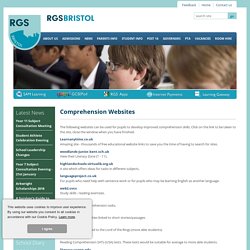
Click on the link to be taken to the site, close the window when you have finished. Learnanytime.co.ukAmazing site - thousands of free educational website links to save you the time of having to search for sites. woodlands-junior.kent.sch.ukView their Literacy Zone (7 - 11). highlandschools-virtualib.org.ukA site which offers ideas for tasks in different subjects. languageproject.co.ukFor pupils who need help with sentence work or for pupils who may be learning English as another language.
Px origins lessons events. Mprehension Schemes. Comprehending Comprehension. Comprehension tests are the most common form of English exam.
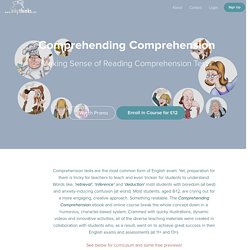
Yet, preparation for them is tricky for teachers to teach and even trickier for students to understand. Words like, 'retrieval', 'inference' and 'deduction' instil students with boredom (at best) and anxiety-inducing confusion (at worst). Most students, aged 8-12, are crying out for a more engaging, creative approach. Something relatable. The Comprehending Comprehension ebook and online course break the whole concept down in a humorous, character-based system. Lit13 teachingreadingcomprehensionfinaldraft. Reading comprehension strategies. Reading comprehension strategies focus on the learners’ understanding of written text.
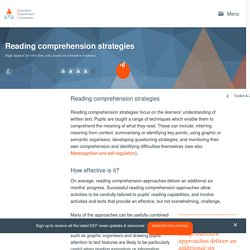
Pupils are taught a range of techniques which enable them to comprehend the meaning of what they read. These can include: inferring meaning from context; summarising or identifying key points; using graphic or semantic organisers; developing questioning strategies; and monitoring their own comprehension and identifying difficulties themselves (see also Metacognition and self-regulation). How effective is it? On average, reading comprehension approaches deliver an additional six months’ progress. Successful reading comprehension approaches allow activities to be carefully tailored to pupils’ reading capabilities, and involve activities and texts that provide an effective, but not overwhelming, challenge. Improving Literacy in KS2.